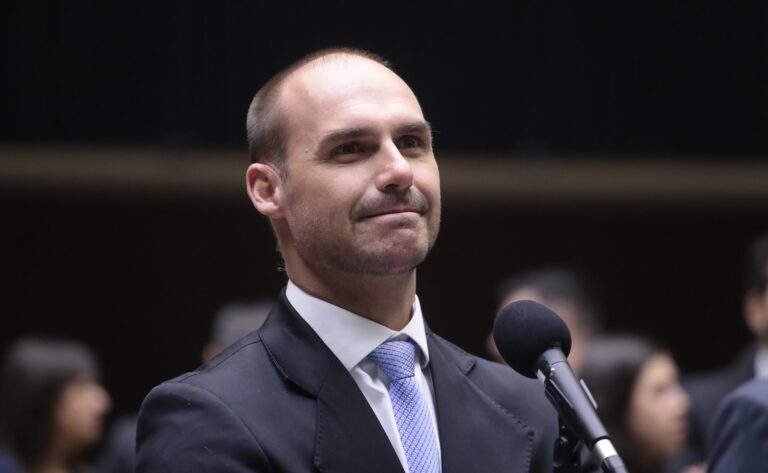In a renewed bid to influence Brazil’s political landscape, Eduardo Bolsonaro, the son of former President Jair Bolsonaro, is advocating for increased pressure from the United States on the South American nation’s current government. Known as “Number 3” within the Bolsonaro family’s political circle, Eduardo is calling on Washington to play a more assertive role amid growing tensions and challenges facing Brazil. This development signals a deepening rift between Bolsonaro loyalists and President Luiz Inácio Lula da Silva’s administration, as international dynamics become entwined with domestic politics.
Bolsonaro’s Son Advocates for Increased US Influence in Brazilian Politics
Eduardo Bolsonaro, widely recognized as the third most influential figure within his family’s political circle, recently called for a more pronounced role of the United States in shaping Brazil’s domestic agenda. In a statement that stirred debate, he emphasized the necessity for Washington to exert diplomatic and economic pressure to ensure alignment with democratic and market-friendly reforms in BrasÃlia. His comments reflect ongoing tensions between traditional Brazilian sovereignty advocates and factions favoring increased cooperation with global powers.
- Advocacy for stronger US-Brazil strategic ties
- Promotion of policies favoring economic liberalization
- Calls for enhanced security collaboration
This push has sparked discussions about the future trajectory of Brazil’s foreign policy, especially in light of global geopolitical shifts and domestic political instability. Critics argue that excessive US involvement could undermine Brazil’s autonomy, while supporters believe it is essential to counter emerging threats and economic uncertainties.
| Key Points | Implications |
|---|---|
| Increased US diplomatic pressure | Potential shift in Brazil’s foreign alignment |
| Focus on anti-corruption reforms | Boost investor confidence |
| Enhanced security cooperation | Strengthened counter-terrorism efforts |
Examining the Implications of Eduardo Bolsonaro’s Push for External Pressure
Eduardo Bolsonaro’s call for increased external pressure from the United States signifies a pivotal shift in Brazil’s political landscape, raising concerns over sovereignty and democratic norms. Advocating for intensified US involvement, Eduardo highlights the urgency of international scrutiny on Brazil’s governance, particularly regarding environmental policies and corruption allegations. This push not only intensifies diplomatic tensions but also threatens to polarize domestic opinion, as critics argue that foreign pressure may exacerbate existing political instability rather than resolve underlying issues.
Several key implications emerge from this stance, including:
- Diplomatic Strain: Potential friction between Brazil and neighboring countries wary of perceived foreign interference.
- Political Polarization: Further division within Brazil’s political sphere as supporters and opponents clash over the legitimacy of external involvement.
- Impact on Policy: Possible acceleration of controversial reforms under the guise of meeting international expectations.
| Aspect | Potential Effect | Stakeholders |
|---|---|---|
| US-Brazil Relations | Increased cooperation or diplomatic friction | Governments, Trade |
| Domestic Politics | Heightened polarization | Political Parties, Citizens |
| Environmental Policy | Faster reforms under pressure | NGOs, Indigenous Groups |
Strategic Recommendations for Balancing Sovereignty and International Relations in Brazil
Brazil’s geopolitical posture requires a nuanced approach that safeguards national sovereignty while engaging constructively in global diplomacy. Eduardo Bolsonaro’s recent calls for increased US pressure highlight the underlying tension between external influence and domestic autonomy. To navigate this, Brazil should consider multilateral diplomacy that reinforces its independence yet opens channels for collaboration on shared issues such as environmental policy, economic development, and security. Strengthening regional alliances within Latin America can serve as a buffer, enabling Brazil to balance foreign interests without compromising its decision-making power.
Practical measures should include:
- Empowering regional blocs: Enhancing cooperation through organizations like Mercosur to create unified policy responses.
- Diversifying partnerships: Expanding diplomatic ties beyond traditional powers to include emerging economies and non-aligned countries.
- Institutional safeguards: Promoting transparent legislative frameworks that regulate foreign influence in domestic affairs.
| Strategy | Benefits | Risks |
|---|---|---|
| Regional Alliance Building | Unified policy stance, economic growth | Potential internal disagreements |
| Diversification of Diplomacy | Reduced dependency on superpowers | Diplomatic overextension |
| Wrapping Up
As the political tensions surrounding Brazil’s leadership continue to unfold, Eduardo Bolsonaro’s call for increased U.S. pressure illustrates the deepening divisions within the country’s governance and its international relations. Observers will be closely watching how these dynamics influence Brazil’s domestic policies and its role on the global stage in the coming months. |




